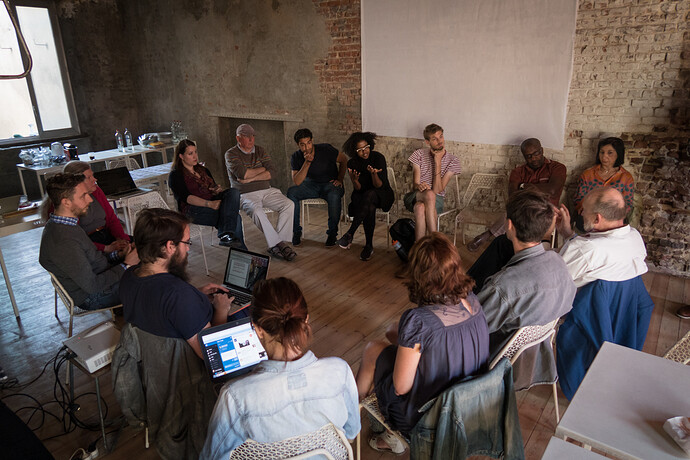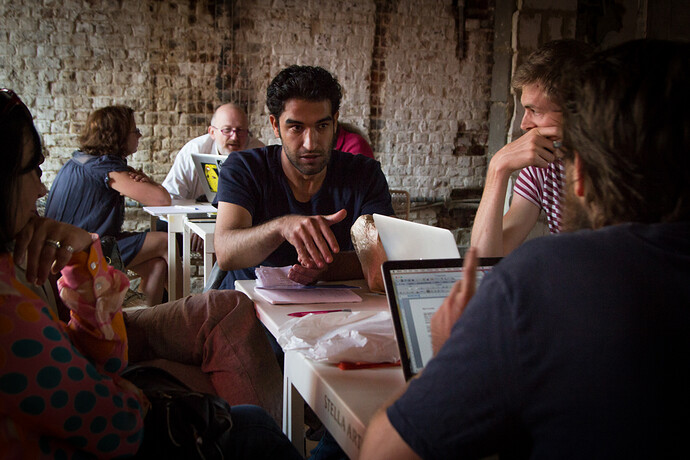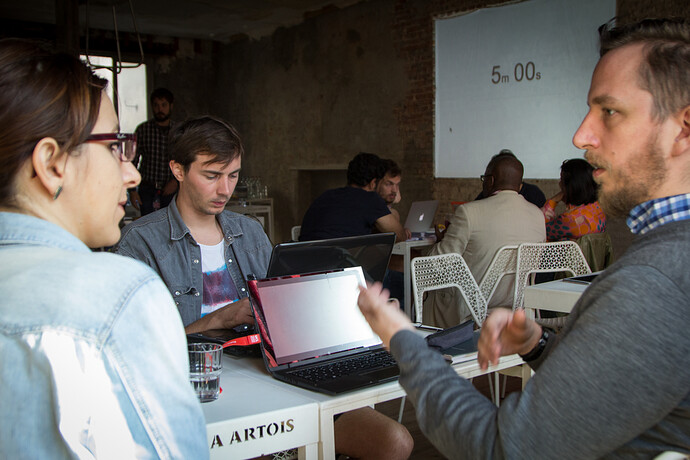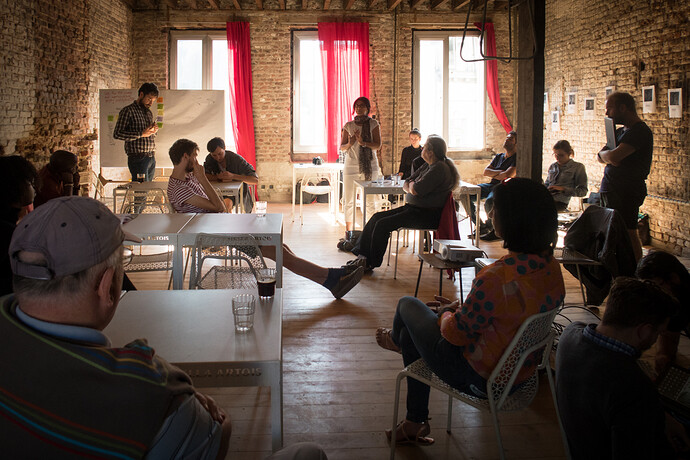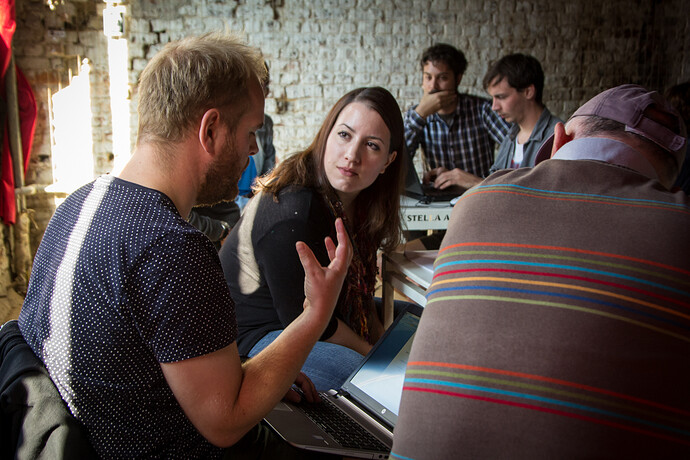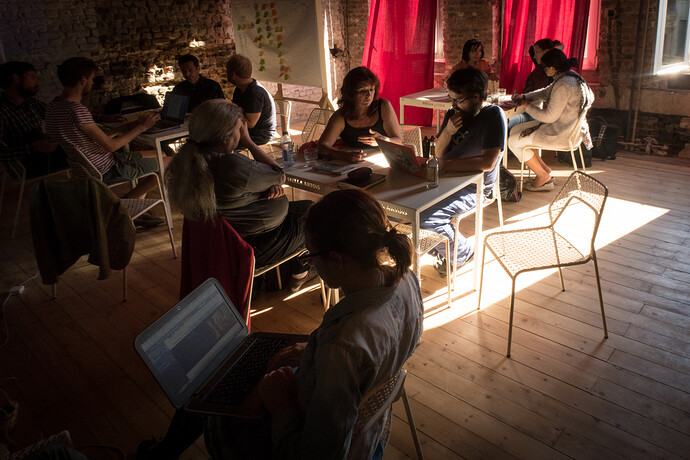Summary ENG + FR
L’atelier a généré beaucoup de contenu que vous pouvez retrouver ici-bas. Mais pour ceux qui se focalisent avant tout sur les résultats, nous avons regroupé les points les plus importants ici :
- Tout le monde souhaite plus de collaboration, mais a des difficultés à rendre cela concret.
Après la première série de discussions, nous avons noté que les organisations de toute sorte sont prêtes à devenir plus collaboratives, mais qu’elles manquent d’outils pour y arriver étape par étape. Elles sont toutes conscientes de la force du travail collectif, mais n’ont jamais eu de succès sur le long terme. Dans cet atelier, nous avons essayé de trouver ce qui était important à réussir pour les collaborations, et ainsi nous en venons au deuxième point :
- Comment créons-nous de la Confiance entre organisations inconnues, mais avec le même genre de pensée ?
Nous avons eu un test grandeur nature : une quinzaine d’organisations, partageant des valeurs communes et disposées à collaborer et apprendre les unes des autres, mais qui venaient à peine de se rencontrer. Après d’autres débats, nous avons réalisé que la confiance était le principal problème. Nous avons donc essayé d’encadrer la création de confiance en nous avons constaté que c’était mieux d’avoir des petits projets entre les différents groupes afin de créer des liens entre les personnes. Ces projets peuvent être des petits projets réalisables en quelques minutes ou une heure. A partir de là chaque pas suivant deviens une tache plus complexe que la précédente pour créer ainsi un lien plus fort.
- Donner de perspectives alternatives aux soins nous fait réfléchir sur notre propre structure de soins.
Finalement nous avions un de participants qui nous a aidés à penser out of the box d’une manière perturbatrice. C’était un refugiée Syrien qui a dû reporter ses études de médicine pour fuir du pays et qui nous a donner beaucoup des choses à réfléchir. Il nous voyait comme des « boxpeople » , vivant dans une bulle et plaçant des autres gens dans des bulles. Les personnes âgées, les sans-abri, les personnes avec des maladies psychologiques, etc. ; ils sont tous placés en dehors de la société.
Il explique qu’en Syrie ils n’avaient peut-être pas un système de soins de santé efficace, mais il est beaucoup plus humain. Ceci nous a fait penser sur la façon comment nous voyons les soins en Europe. C’est aussi lui qui nous a signalé sur le problème de confiance qui est créé ici dans l’ouest.
The Workshop gave us a lot of content that you can find here. But for those who are result oriented we compiled the most important knowledge bubbels here.
- Everybody is in search of collaboration solutions, but have difficulties realizing them.
After the first round of discussions we noticed that all kind of organizations are ready to become more collaborative, but they are missing the step-by-step tools to achieve this. They all are conscious about the power of collaboration, but have never had successful long lasting experiences. The goal of this workshop was to find the key elements to make a collaborative initiative succeed, this leads us to the second point.
- How do we create trust between unbeknown organizations that share the same way of thinking?
We had a great test case: around 15 organizations that came together for the first time, all sharing the same ideas and willing to collaborate to learn from each other. After a lot of discussions we discovered trust was the main issue. So we tried to frame how trust is built and concluded that we needed to start with small projects with each other, these projects don’t need to be longer than a couple of minutes/hours, this way people start to bond. After that each following project can become more complex to create a stronger bodn between the participants. We listed a couple of thing each would do, to immidiate have a Proof Of Concept.
- Giving other perspectives of care makes us think about our own caretaking structure
Finally we had one person that helped think out of the box in a really disruptive way. He was a Syrian refugee that had to postpone his medical studies/Ph.D. To flee the country and gave us a lot of material to think about. He saw us as ‘boxpeople’, living in a bubble and putting others in bubbles. Elderly, homeless people, psychological ill are all given a space outside society. They maybe didn’t have the most efficient healthcare system, but he explained it was much more humane. It made us think a lot about how we see care in the west. He was also the person that pointed out the problem of trust we create in the west.
Last Saturday we hosted a quit successful workshop in Brussels around the Open & Care thematic with local participants and workers of the designated field. We had a set up loosely based on the Berlin workshop and will go deeper into the methodology, the preparation, the participants and outcome in the following text. This article is a more organized version of the thinkpad we put online at the workshop and where people could transcribe what was being said.
Preparation
- Reaching out
In the beginning of the preparation of the workshop I reached out to my network of socially involved people who could have interesting stories to add to the platform. It was sometime difficult to explain them the whole concept through mail, so I decided to meet the people who wanted more information. This gave me the following graphical content. Without surprise the most active and responsive people came from the makers and changemakers scene. They immediately connected to the higher goal and activated their network. The least responsive network where the politicians, coming back from their annual non-active period it was difficult to activate them. Every attempt ended up in a dead end.
But after a couple of weeks building up a community, a moment of panic occurred. The people where reacting positively towards the workshop, but hesitated to get more involved. The confirmed list of people was stagnating, so I opened a debate on the Edgeryders platform to see how we can resolve that issue. After getting some clarifications from the team that organized the Greek workshop and some tips from people that organized a lot of workshops i changed my method and opened up with a more general approach through mailing lists and facebook groups. The combination of both locally anchored contacts and general presentations of the workshop filled the last gaps. We had 28 confirmed people and around 40 interested contacts in a mailing list.
- One on One discussions / Text submissions
Before the workshop occurred this where the people wanting to start already a conversation on their work around social and medical care. Some articles will be added in the future because they are still under construction.
- Xavier – Makestorming (French version, English version)
- Yannick – Huis VDH (Text 1, Text 2)
- Sigried – Repurposing space
- Ginette – Sidenote on the role of the gouvernement
- Laurent – DoucheFlux
- Maite – Infirmière de Rue
- Winnie – ReaGent (Text 1, Text 2)
- Intergenerational Care: A Game that never was
- Ybe – Traumatour
- Rozina – Belgium Design Council
- Preparing the space
For the people at Huis VDH it was also a big challenge to prepare the space that was under construction for already two months. The house is being renovated and invented by a team of volunteers to become a hub for social, cultural and technological innovators. Each of the core members took a task to facilitate the workshop. Maria found a socially involved catering service, Sigried arranged the space to be workshop ready, Toha was responsible for the photographical documentation and Cecile prepared everything so the outcome would be documented in a nice visual style by using Toha’s skills and the templates. Yannick participated and worked as a transcriber at the workshop
Methodology
We based ourselves on the Berlin workshop that was filled with interesting methods to actively think about care issues in Belgium. We made our workshop a little less dense because we didn’t think we could go through all the materials they prepared.
In the link above you can find our preparation of the Brussels version, like said before it is a watered down version of the Berlin workshop while also using some methods Stefanos and Nadia came with. Both are experienced facilitators.
- Roles
- Workshop leader
We decided that Nadia will take the lead on this workshop cause she is the most in touch with the OpenAndChange material and has a lot of experience doing so. She also presented the whole OpenAndChange project in the beginning of the day. Her firm method helped to not defer to long to side discussions and held us on the right pad.
- Facilitators
Stefanos proposed himself as a facilitator and helped us streamline our toughs throughout the day trying to condense all the ideas that where emerging in little post its on a white board. I helped out by translating the most difficult parts in French or English so anybody could speak there native language if needed. This facilitated the conversation.
- Documentation
Cecile, Noemi and Toha played all an important role in the documentation. Noemi setting up the Thinkpad so we could transcribe live as a team what was being said the whole day. Cecile making a visual representation of the most interesting quotes combined with a picture of each made by Toha.
Participants
From the 28 confirmed, 17 people came by that day to discuss care related topics. Here is a short introduction of each of the participants. You can find some of their quotes, issues and solutions on this document made by Cecile and Toha. Contact info can be found here.
- Xander: Child Psychologist: Works with young children, works with behavioral problems and autism.
- Benoit: Is an all around inventor and changemakers, first member of the Huis VDH family and makes ‘finding solutions to complex problems’ his general duty.
- Selvi & Lotfi are a couple of active Belgian that had an home for the elderly for more than 20 years. Now they are dreaming of building a micro-city where all generations could interact with each other and where care would be more then only what the government gives.
- Alkasem is a Syrian refugee; he was 4 years in the doctor studies but couldn’t continue there. When arriving in Brussels he couldn’t start over here neither.
- Claire is also part of the Réseau Solidaire and wants to build a platform for people who give and receive informal care. Her goal is to make it a place where people can feel save and where receivers of care can themselves give care to others.
- Loic: Concerned Architect that worked on a paper about alternative housing that can be found here
- Noemi: Co-Initiator of Edgeryders.
- Winnie: Coming from Ghent, involved in DIY Biology (hacking and thinking outside of institutions and companies to make biology more accessible). At ReaGent people will get biological tools to build their solutions. We have equipment and a physical space and make sure that science is communicated in an accessible way. We put an emphasis on children and privileged groups, otherwise they don’t get access at all.
- Adeline: She is a newcomer in Huis VDH and in general interested in new solutions around society. She came by to be an observer but stayed to participated to the discussion.
- Jean: Is a member of the association ‘réseaux solidaires’: a group to help people with mental health issues and who are isolated from society. There is no website, everything is person related. He is a member because he is sick himself.
- Rozina: co-founder of Belgium Design Council and has a talent to bring people together. Was involved in the successfully funding of bar Eliza, a community project in Koekelberg and is now helping to structurize a youth football club Rittersclub.
- Gilles: Former medical representative, meeting with doctors made him realize that he was more interested in preventing health. Passionate about healthy food, he want to inspire people to cook more and created a platform called Zingmenu therefor.
- Sophie works for the non-profit organization En Route ASBL that help people rehabilitate after difficult psychological periods in their life.
- Marie-Ange works already 25 years in the field of ecology transition and moved now towards housing and mental care.
- Laurent founded DoucheFlux 4 years ago and is now preparing to move his project towards a 1600 m2 space. He wants to empower poor people through giving them access to basic needs like showers and involving them in organizing events.
- Yannick: Co-founder of Huis Vdh and worked some years ago on a video game around intergenerational care.
Outcome
- Introduction to OpenAndChange by Nadia (Link to presentation)
Edgeryders is an open source platform that combines online and offline moments to find through other ways than the mainstream solutions for sociatal problems. Mission is to support members to create self-sustaining projects.
Edgeryders creates tools to manage all the content created by the 3500 members. Open ethnographic tools for example uses the data to see what discussions are well connected.
The big question that is asked as a red line throughout the day: Can healthcare systems work like Wikipedia, StackOverflow or other massively coordinated systems with very limited control and overhead?
Two mechanisms at stake:
-
self selection: individuals get involved in something because they want to, and contribute because they want to
-
social networks: people and groups which move fluidly across organisations and shaping the norms as they wish
Case studies of how people access community care:
What is op3ncare in short:
-
A place where we can share stories about care
-
Where you can find people to support projects
-
Where you can create solutions without being in the same place
- Learning From Experience
After the general introduction, the participants are asked to be devided into groups of maximum four people where they will discuss using a template about their projects. Each of them gets 10 minutes to introduce him or herself while somebody else takes notes and a third person ask questions and listens carefully.
You can find the note of each of those roundtables here, some of them are in French and other in English. It is written by the participants and wasn’t cleaned up.
- Plenary
Before the lunch we came together for an hour and shared what was remarkable about each other stories. Here you can find some of the insights
Winnie: he noticed that every project has some community in it, but communities experience different ways of being in the world, different incentives for being in a community.
Laurent: 3 different projects, which have something in common, with people being excluded by the system because they are poor or sick. Empowerment for these populations is at the core of each project. Behind each there is a diagnosis of how the excluded population can have lost access to institutional support. If something is possible, it is on the edge, where people can regain access to their lives.
Lotfi: Nous étions trois entités, je suis avec Selvi, nous avons eu une maison de repos, Xander travaille avec des enfants autiste, Alkasem, il espère qu’il pourrait faire son métier de médecin. On a parlé d’intergénérationnel, comment créer des mini société ou il y a des échange. Au delà d’un certain âge: il y a pas de support. Alkasem a fait la parallèle de comment le système de soin ce passe en moyen orient, une culture musulman de l’entraide. On impose de donner de l’argent au pauvre. Tout le monde vie ici dans sa bulle, il n’y a pas de transversalité.
Xander: the community aspect is really important, the human is seen as a kind of predator, humans are also caring beings.
Alkasem: i have question to all of you: where are the families of the homeless people? I never saw anyone homeless in Syria, or living on a mattress. How did it happen? Some of the participants responded later on:
- the core family concept has been broken down - after uni and growing up you have to carry yourself; so there is no glue which keeps family together
- in North Africa systems are weak -so there has always been a cultural support; whereas in the West the system is supposed to take care of everything
- Here (in the West) you are free, but alone!
- "Free, but alone." vs. "Belonging, but coerced" Comparing systems-based vs. family-based cultures of care (twitter link)
Jean: There is a desire of using new ways of technology to organize his place within the society je cherche a me socialiser, trouver une occupation profitable, mais je voudrais rester dans la marginalité. Find a meaning in his life, but stay at the edge of society.
Claire: I want to create something can provide something that can give help to each other. It is very complicated to arrive there. With Laurent, Sophie, we have a point of connection, but we need to know each other better. I worked for several years around the project of self-care. I want to do something very new. We are creating to work on a project on different levels in December with Laurent, but it is really difficult to find what is most needed: partnership and collaboration.
Adeline: Everybody here came with a need, to find ways to come up with a solution, tous le monde est venue avec un besoin, elle espère aider à trouver une solution.
Gilles: Strongly believes in open source and data sharing solutions - everyone is looking for someone who can help them with a solution eg. to develop a website to help the project moving.
Loic: The core needs he noticed in others is to learn information about what others are doing, get information about collaborations; and second, the need for visibility. Personally he has come here for housing project, but Winnie’s story is useful to hear also professionally.
Yannick: was in conversation with Kacim,Lotfi - the intergenerational interactions need to be looked into, because it is in only specific circumstances that we spend time together eg living in a house with my grandmother and the positive outcomes which came from that.
<strong>SIDENOTE: Multiple times in the discussion a same metaphor that was introduced by Alkasem was used by the participants. He noted that our western society made us all ‘boxpeople’. He finds it so strange that we are all living next to each other, but that we aren’t interacting better. We put old people in a home and (mentally) sick people in a closed environment. I found that metaphor really strong and something to use when we are trying to connect multiple organizations. </strong>
Question time
After giving everybody the chance to share their view on the received input we gave everybody 5 minutes the time transcribe it in a question they wanted to solve in the second part of the day. These are the questions that came up:
-
How can communities become more visible and members interact more easily?
-
How do you make the actions of the community visible to the individuals?
-
How do you make individuals’ actions more visible to the community?
-
How can we help individuals be independent from official caring services?
-
How do we invite more people to be part of the process and disseminate the documentation?
-
How can we find the right balance between keeping the effectiveness of the box with still being able to go out of the box/
-
What is the metaphor of what we are trying to do? (Stefanos) helps understand complicated things without
-
How do you build connectivity into each initiative or do you want connectivity only between initiative? If we all want to coordinate, what amount of time/ effort/ resources can we each put into learning to coordinate?
-
How could we open the debate about the strength of intergenerational care.
- Presentation Projects
Some of the participants prepared a presentation of their projects. Three of them where DoucheFlux, Belgium Designers Council and Habitats 123: A testcase of alternative housing. A summary can be found here:
Laurent d'Ursel / DoucheFLUX:
4 years old project, we are opening a huge house to help people out of the marge, we will have 20 showers, 150 lockers, medical service, laundries, a pharmecy, and other needed services for this part of people, which is missing
Second pillar is activities: DoucheFlux is 50m2 at the moment, so we work at other spaces, we make activities that promote self esteem for these people, they are totally embedded in the system, they can’t escape what is happening about them, they find it difficult to get further, so their mechanism is that they just stop trying, because they don’t feel empowered anymore
Doucheflux helps them to get more self-esteem, but it is difficult because sometimes it feel that we are infantilizing them, and if you do that mistake they don’t come anymore
The challenge: another way to make social work, so not only people that studied for the social sector. To take the social dream out of the social field and bring it to other fields. Because they are fed up of all the social help, they just want a happy life: it is not only important to have an home, but also to create great moments. To create equal relationships. break racism against the poor.
Rozina / Business Imporvements Design Belgium
Living in Bxl for 15 years, an interior designer coming from a corporate background working in the hospitality business. She started her own design company and got more involved in strategic design thinking - now involved with the Belgium Design Thinking. Projects to make the sports clubs more inclusive because they were closed for refugees; also hardly accessible by children with special needs. So with other people they pushed for inclusivity and speaking to the Belgium Football Union, but also preparing a strategy for the next few years.
Business Improvements Design Belgium (BIDs): they are about creating a new geographical zone and linking community businesses to it, ideal for private - public partnerships.
She is lobbying for BIDs and wants to see where stakeholders can meet in the middle; seems idealistic especially since she’s not from here.
Has seen encouraging results after talking to her mayor, and right now she’s trying to create a youth platform for citizenship and sports - an IDEO design type of commune.
What changed after the football? People understood there is a strategy and structure, so they get a sense of belonging. If everybody contributes something, we become as a community.We educate the value of communication, transparency…
Rozina would need help to connect with people working hands on with special needs populations.
Loic / Right to Housing in Brussels
Previously office building occupied by the French community which had been vacant for 15 years. Groups of squatters moved in and made a deal with the owner to run different workshops - bike fixing, woodwork, IT etc.
Some interesting facts from his paper:
-social housing in Bxl is much lower, 7 % compared to the 27% in the Netherlands
-7 % of houses totally empty
-1 000 000 sq metres of unused office space: 40% of empty offices have been empty for 7 years
From squatting to a participatory process - a public owned space (Community Francais) but community managed: from refugees to Irish artists to Flemish doctor students. Half the people (of 60) don’t have any revenues, and everyone contributes a little - from 60 eur a month to approx. 150. In Belgium it is possible to have a temporary legal occupation for an office, so you can live in an office space!
It’s an office building, which means people can change the layout easily.
Difference between buildings for profit and the testcase of 123:
Profit building is praised for being open while just having 7% of their space being used for community. 123 has almost 50% of community used space, but because of their ‘illegal’ status it isn’t praised.
Loic showed a detailed distribution of the types of spaces - at each floor you’d have facilities, workshops, library + distribution of private and communal space.
Important detail: Stairs instead of working elevators as a social control mechanism.
Loic is trying to give more visibility to housing solutions - it’s not easy, take good contact with the owner! First you squad, then you talk.
- Collaboration Mosaic
Now it is time to get into the concrete part of the workshop. Therefor everybody is put again into groups of maximum four people and asked to choose one of the skill cards on the table. From there they will explain why they chose that card and what skills they want to bring. Here are the skills we find in our most helpful people
Winnie:
-
DIY and generally fixing things yourself
-
Mental support
-
Getting weird things you wouldn’t normally find yourself
-
A delivery van
-
Someone to do a project with
Jean:
-
Can discuss Existential problem
-
Commercial things and buying decisions
Claire:
-
Making a conference atelier du capitalisme
-
Support people who are more fragile
-
Set up an association
Marie Ange:
-
Linking Activities
-
Mental/ moral support
-
Social contacts
Rozina:
-
Business
-
Experience and wisdom
-
Out-of-the-box thinking
-
Empathy
-
Government administration
-
Cultural awareness
Adeline
-
Active listening and sensibility
-
Wisdom and pragmatism
-
Do it yourself, engineering as a way of seeing the world
-
Cars
Lotfi
-
Fundraising and financial subsidies
-
Medical technical knowledge
-
Business modeling
-
Administration
Gilles
-
Administration
-
Legal advice
-
Social business modeling
-
The WHY
-
Sharing economy
-
Scientific dieticians
Xander
-
Friendship
-
Philosophy
-
Playing music
-
Word stuff
Stefanos
-
Order/ being orderly
-
Moral support and push to go forward and not backwards
-
Fun
-
The occasional hug
SIDENOTE 2: Alkasem was again the most disruptive thinker in the group and gave us a lot to think. For him, everything moves around friendship. He has the feeling that a lot of people in western society start of with mistrust. If you start with mistrust it is difficult to create trust. And without trust no skill can be shared. This intervention of him started a discussion about the meaning of trust and how we can build that.
‘Trust is an enabler to use the resources. How can that be created inside an eclectic group like this?’,asked Yannick. For Claire it is a text and rules of engagement and a clear path of conflict resolution, and a way to learn to treat each other better.
Winnie reacted that your own people’s trust is a constant, but gaining the network’s trust is more difficult.
Nadia tried to made a synthesis of the discussion
-
Working trust is very different from social trust; and there needs to be a boundary.
-
What also worked for her is deciding to work on even a small project.
-
A story that binds us together - understanding how our different activities are
-
Documentation: what does it mean? for us it has been in writing.
Finding each other strengths and weaknesses by organizing small events with each other, and beginning with things that don’t have something big at stake. Because then we can learn about each other. The importance of documentation in building trust: Leaving a story behind that people can follow.
- Trust Exercise
When the discussion was coming to an end we all felt we had got a lot of information and the workshop was going to close. So Nadia came up with a good idea to end the workshop with something concrete. We all felt that one of the biggest issues in care is that we live to much on our own island and that if we want to make care better we need to share and collaborate. But to collaborate we need to create trust. So this exercise was given to every participant and will hopefully end up in solidifying the care network in Belgium. The following question was asked:
What can i bring to another organization, that also better myself as a person and is easily realizable?
-
Loic wanting to work with the firm of Winnie
-
Yannick giving his game about intergeneralisation idea to Lotfi and Selvi
-
Marie-Ange wants to give information to Lotfi and Selvi also
…
Nadia Suggestion: meet in one month: Back in Huis VDH. We will invite new people to continue the conversation and structure the informal and formal networks of care.
I would like to thank all the participants for this awesome day we spend reshaping care on a local level. I hope this is the start of something lasting. We invite all interested people and participants to fill this FrameADate link so we can organize the next gathering. At that event you will all be given a reworked paper version of the outcome of the workshop. If you have any propositions or ideas you can contact Edgeryders or myself: yannick.schandene@gmail.com
